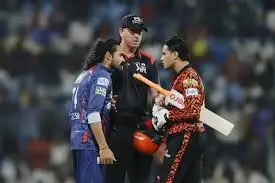‘You play by laws, disappointed when spirit of game is invoked’: Harsha Bhogle on Digvesh Rathi-Jitesh Sharma run out incident

The Incident: Rathi’s Attempted Run-Out
During a tense phase of the game, LSG’s young spinner Digvesh Rathi noticed RCB’s Jitesh Sharma stepping out of his crease at the non-striker’s end. Instead of delivering the ball, Rathi stopped mid-action and removed the bails to attempt a run-out—often referred to as a “Mankad.”
The umpire paused for a decision, but LSG captain Rishabh Pant intervened and withdrew the appeal. As a result, the umpire ruled Sharma not out, citing MCC Law 38.3, which allows the fielding side to attempt such a dismissal but also gives them the right to revoke the appeal.
Harsha Bhogle’s Take
Veteran cricket commentator Harsha Bhogle weighed in on the incident through social media. He stated:
“You play by laws, disappointed when spirit of game is invoked.”
Bhogle highlighted the inconsistency in criticizing players who follow the rules. He argued that people often invoke the “spirit of the game” selectively, especially when the outcome feels unfavorable. For Bhogle, if the laws permit a run-out, the criticism should not follow.
In the past, Bhogle defended Indian all-rounder Deepti Sharma when she dismissed Charlie Dean at the non-striker’s end during an ODI against England in 2022. He condemned the backlash Deepti faced and called for greater respect for the laws of the game.
Split Opinions: Rules vs. Spirit
This incident divided cricket fans and pundits. Some praised Pant’s gesture as upholding sportsmanship, while others felt he denied Rathi a legitimate wicket. Many argued that Sharma, by leaving the crease early, took an unfair advantage. In their view, the fielding side had every right to enforce the rules.
On the other hand, critics of such dismissals believe players should issue warnings before going through with the act. They say it reflects better on the spirit of cricket, even if the law doesn’t require it.
Digvesh Rathi: A Rising Star Surrounded by Controversy
Digvesh Rathi, playing his debut IPL season, has already become a talking point—both for his performance and his aggressive style. The left-arm spinner currently boasts seven wickets at an economy rate of 7.75. Despite his success, he has drawn criticism for his animated celebrations.
One such instance occurred when Rathi dismissed Priyansh Arya and performed his signature “notebook celebration,” pretending to tick the batter’s name off a list. Former Indian captain Sunil Gavaskar disapproved of the celebration, calling it unnecessary and attention-seeking.
While some fans enjoy his flair, others feel Rathi needs to tone down his theatrics and focus more on consistency.
Law 38.3: Clarifying the Rules
MCC Law 38.3 permits bowlers to run out a non-striker if the latter leaves the crease before the bowler releases the ball. In 2022, the MCC moved this rule to the general run-out section to remove ambiguity and eliminate the need for prior warning.
The law leaves it to the fielding side to decide whether to appeal or not. This discretion puts players in tricky positions—should they strictly apply the rule, or consider the unwritten norms of sportsmanship?
Bhogle believes that the cricketing community needs to stop sending mixed signals. He argues that if players act within the rules, criticism under the banner of “spirit of the game” becomes unfair and counterproductive.
Conclusion
The Rathi-Sharma incident may have lasted only a few moments on the field, but its impact has stretched far beyond the boundary ropes. It has once again forced players, commentators, and fans to question where cricket should draw the line between law and spirit.
By reinforcing his consistent stance, Harsha Bhogle calls for clarity. His message is simple: let the laws govern the game. If everyone respects them, there’s no need to question a player’s integrity when they enforce them.






